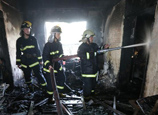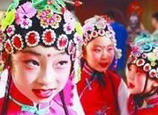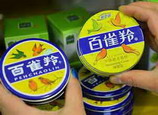
Action star Jackie Chan is known to be an ardent patriot, but he has drawn fire for his recent decision to donate ancient Chinese architecture to a Singaporean university for research and display.
The four structures are part of Chan's 10-piece collection of architecture unique to southern Anhui Province and its environs and were originally gifts Chan bought for his parents, he tweeted on April 4
The structures - two residences, a pavilion, a theater stage - are made of premium sandalwood and date back 200 to 400 years. After his parents' deaths, they had been left derelict in warehouses for years, and had been food for termites.
After the Singaporeans met Chan and explained their expertise in restoration and preservation of what he called "architectural gems," the actor agreed to the donation plan. He said he also felt the impulse to donate all the rest.
Chan's planned donation sparked a fierce backlash he probably didn't anticipate. Online commentators advised him to withdraw the planned donation, saying it would constitute a loss of cultural heritage.
Experts on relics protection also turned up the heat on the movie star by saying that if the antique houses are designated as Chinese relics, then it is forbidden to sell or transfer ownership.
Critics even taunted Chan by citing his latest film, "CZ12" (2012), in which he plays an agent sent on a global patriotic mission to rescue the 12 bronze heads of Chinese zodiac animals looted from the country in 1860s.
To the chagrin of the cult figure, he enjoyed the support of only a few, who said there is no evidence that the structures are national patrimony.
Politically incorrect
Still, many are urging him to drop the idea, saying even if his collection doesn't qualify as protected relics, it's politically incorrect to give it to foreigners.
The handling of cultural heritage is always a sensitive topic. Any news of articles quintessentially Chinese being smuggled out of the country or legitimately sold overseas is a lightning rod for popular anger. A nation that once suffered the mass ransacking of its relics obviously cannot allow that to happen again.
That said, hurt pride shouldn't justify a knee-jerk, parochial objection to trade in cultural objects, provided it is legal.
And let's admit it, these antiques will perhaps be better off if they fall into Singaporean hands than if they stay put in their home province.
Due to years of neglect, many of the dwindling number of Anhui-style structures are badly rundown and dilapidated. An unidentified commentator is quoted as saying in People's Daily on April 8 that for want of funding and interest, both the owners and local authorities can do little to protect these architectural specimens.
It's safe to assume that were it not for Chan's acquisition, the structures would already have crumbled or, more likely, been looted or bulldozed to make way for development.
Antiques trafficking
So is it really that unacceptable if he donates them to Singaporeans, who in some ways are more Confucian, or indeed Chinese, than many of us and may know better how to treasure and preserve them?
Besides, the reality confronting the Anhui-style architecture at home doesn't strengthen the hand of Chan's critics.
Xinhua Daily Telegraph reported on April 8 that in southern Anhui, many people have made a fortune by trafficking in stolen wooden architectural elements including carved beams, pillars, window lattice, old bricks and stone carved in relief, among many typical architectural features.
In Xiuning County, Huangshan City, Yinyu Hall, an iconic structure spanning two centuries, was dismantled in 1997, its various pieces numbered and shipped to the United States where it was reassembled. Since 1949, the amount of timber and debris from old Anhui architecture could have built an entire village, an expert told the newspaper.
Our officials are busy erecting replicas of exotic European or North American towns, and take a much smaller interest in spending money on protecting dilapidated relics of their own.
Except for a few committed to saving domestic architecture, the public is sometimes complicit in its demise, extolling anything Western as superior to Chinese vestiges of the past.
The fuss over the donation would be worth it if the furore can generate genuine concern and protection for Chinese architectural relics.
Some authorities in Anhui have said they welcome the antique houses to "come home."
If they mean it, Chan might give his donation plan a second thought.

















 Photo story: A family infected by HIV
Photo story: A family infected by HIV


![]()
